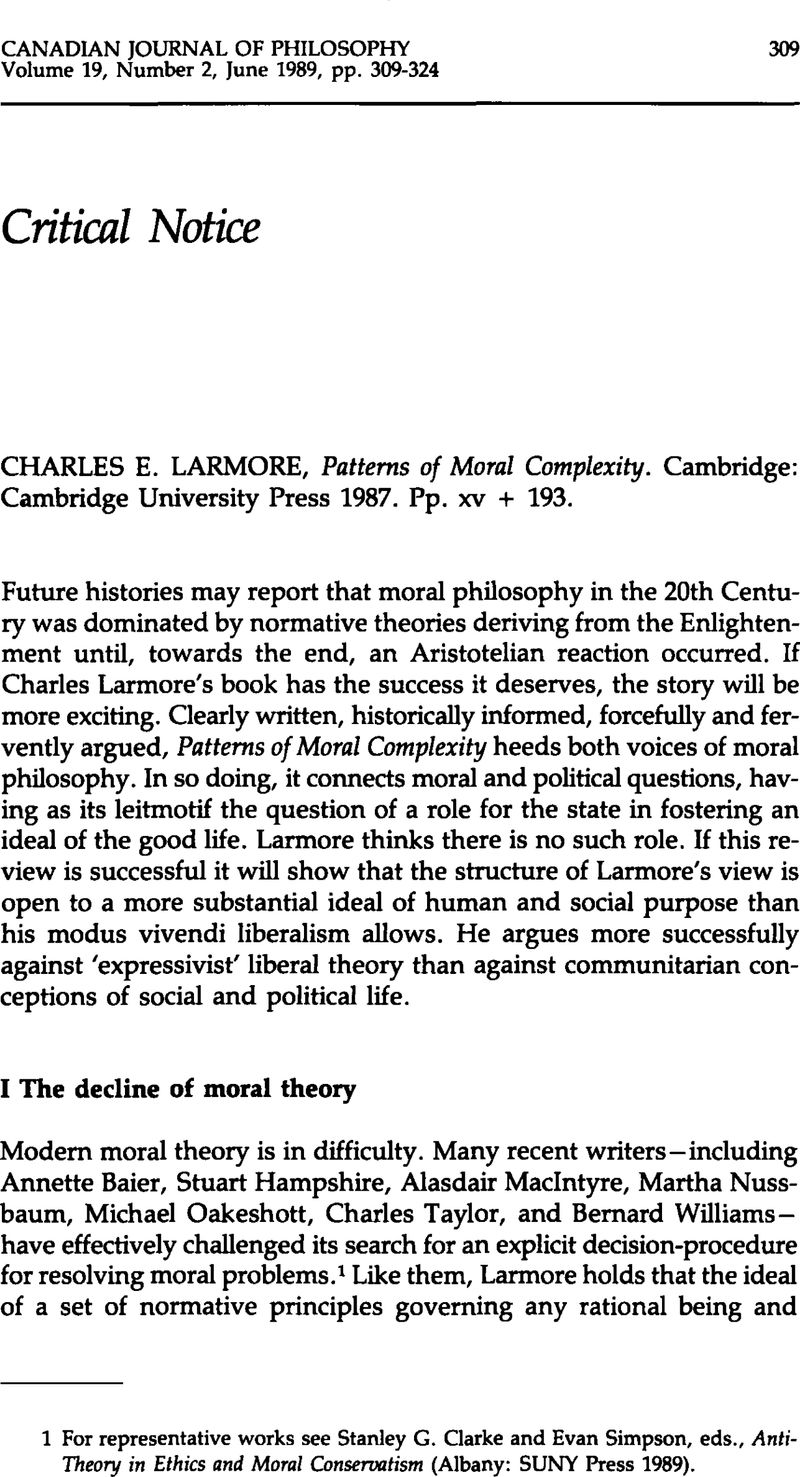No CrossRef data available.
Published online by Cambridge University Press: 01 January 2020

1 For representative works see Stanley G. Clarke and Evan Simpson, eds., Anti-Theory in Ethics and Moral Conservatism (Albany: SUNY Press 1989).
2 Stuart Hampshire, Morality and Conflict (Cambridge, MA: Harvard University Press 1983), 136
3 Martha Nussbaum, The Fragility of Goodness: Luck and Ethics in Greek Tragedy and Philosophy (Cambridge: Cambridge University Press 1986), 10-11
4 Alasdair MacIntyre, After Virtue (Notre Dame: Notre Dame University Press 1981), 245; W.B. Yeats, The Collected Poems (New York: Macmillan 1960), 184-5
5 A more sustained statement of this view is given by N.J.H. Dent, The Moral Psychology of the Virtues (Cambridge: Cambridge University Press 1984).
6 MacIntyre, After Virtue, 67
7 On these points see Jerome Schneewind, ‘Moral Crisis and the History of Ethics,’ Midwest Studies in Philosophy 9 (1983) 525-39; Jeffrey Stout, ‘Virtue Among the Ruins: An Essay on MacIntyre,’ Neue Zeitschrift für Systematische Theologie 26 (1984) 256-73; R.S. Peters, Reason and Compassion (London: Routledge and Kegan Paul 1973), 11-15.
8 Richard Bernstein, ‘From Hermeneutics to Praxis,’ in Philosophical Profiles (Cambridge: Polity Press 1986), 109-11. The issue is pressed by Jerome E. Bickenbach, ‘Legal Hermeneutics and the Possibility of Legal Critique,’ in E. Simpson, ed., Anti-Foundationalism and Practical Reasoning (Edmonton: Academic Printing and Publishing 1987).
9 Cf. Bernard Williams, Ethics and the Limits of Philosophy (Cambridge, MA: Harvard University Press 1985), 135-42.
10 cf. Jürgen Habermas, Autonomy and Solidarity, P. Dews, ed. (London: Verso 1986), 58-9.
11 Similar motivations inspire Thomas Nagel's ‘Moral Conflict and Political Legitimacy,’ Philosophy and Public Affairs 16 (1987) 215-40.
12 Jürgen Habermas, Legitimation Crisis, trans. T. McCarthy (Boston: Beacon Press 1975), 17
13 On expressivism, see Charles Taylor, Hegel (Cambridge: Cambridge University Press 1975), 13-29.
14 Some possibilities are explored in Evan Simpson, ‘The Development of Political Reasoning,’ Human Development 30 (1987) 268-81.
15 See Karl Marx, ‘Critique of the Gotha Program,’ in R.C. Tucker, ed., The MarxEngels Reader (New York: W. W. Norton 1978), 531-2; and Evan Simpson, ‘Socialist Justice,’ Ethics 87 (1976) 1-17; 2-3.
16 On this conception of practical discussion see Evan Simpson, ‘Moral Conservatism,’ The Review of Politics 49 (1987) 29-58, 50-3.
17 F.M. Barnard and Richard Vernon, ‘Recovering Politics for Socialism: Two Responses to the Language of Community,’ Canadian Journal of Political Science 16 (1983) 717-37
18 Reasons for doing so are suggested in Evan Simpson, ‘The Priority of Needs over Rights,’ Social Theory and Practice 8 (1982) 95-112.
19 Charles Taylor, Philosophy and the Human Sciences (Cambridge: Cambridge University Press 1985), 233